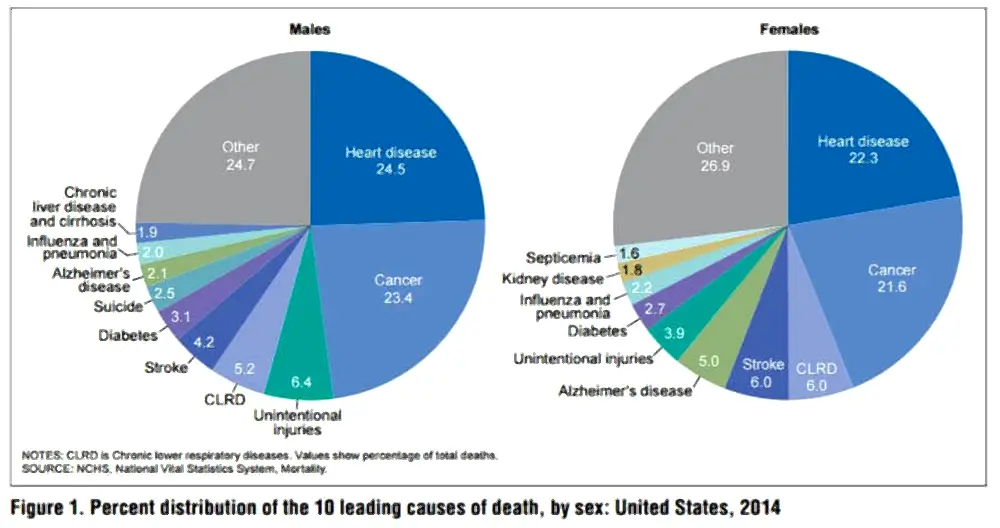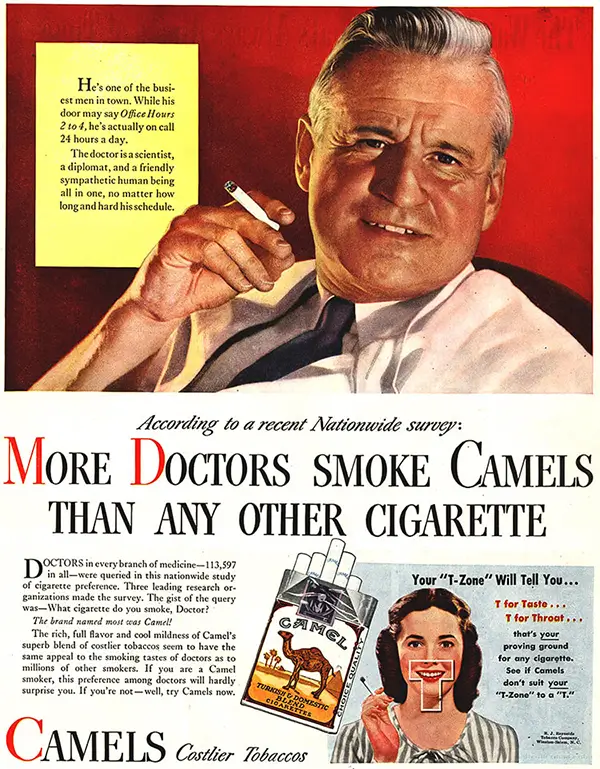Chronic diseases and mortality- The real numbers
In the top 10 leading causes of death, this includes chronic diseases, most are caused by a non-evolutionary congruent diet (high amounts of animal products).
Milos Pokimica
Written By: Milos Pokimica
Medically Reviewed by: Dr. Xiùying Wáng, M.D.
Updated June 9, 2023Most of our chronic diseases are caused by diet and lifestyle. People have a hard time believing how many serious health problems are caused by a non-evolutionary congruent diet. Every year Center for Disease Control and Prevention updates the list of leading causes of death in the United States and for all other developed countries statistics are very similar. When you are developed as a nation, then you have more money to spend on processed food and meat. Of the 10 top leading causes of death, most are caused by life choices. The data is alarming. It is beyond that.
I will try to translate data from the chart to be more clearly understood. When data shows that 24 percent of people are going to die from heart disease what that means is that for example if you have a family of four, one of them will probably die from heart disease and one from cancer. Two left. Then after that, go and take your pick, you have diabetes, stroke, different neurological conditions, or liver cirrhosis, crld is 5% (tobacco smoking is by far the most critical risk factor for chronic bronchitis and emphysema, accounting for about 80% of all cases). All of these diseases are chronic diseases. They didn’t exist in the past in such large numbers. When someone says chronic diseases what they actually mean is lifestyle diseases.
The other side of the coin is that normal painless death by natural aging, just forget about it. Doesn’t exist anymore. The problem is not just about the way we are going to die, it is more about when because life expectancy is dramatically shortened and our quality of life is destroyed. We are not going to just drop dead from cancer. There is going to be a lot of chemotherapy and depression and again cancer goes away then reappears again after a couple of years. When you have a stroke and still manage to survive, you can lose a big chunk of your brain, and before you die from a heart attack, there are going to be a lot of treatments.
What treatments include are all the lifestyle changes to correct the bad habits that have led to the creation of chronic diseases in the first place that we do not like, plus drugs and surgery. Quitting smoking, physical activity, maintaining a healthy weight, and managing stress (getting upset or angry can trigger a heart attack). No salting of food and of course cholesterol-lowering drugs. Statins are the standard line, and almost all patients will be prescribed one of them but what they do not like to tell is that statistically when we look at real numbers, they are only useful in the early stages of treating heart disease. They are effective also in those patients that are at elevated risk but still without cardiovascular disease as some sort of prevention. Statins also, and that is rarely mentioned, have side effects that are no joke. They include muscle pain, the risk of diabetes mellitus, and abnormalities in liver enzyme tests.
Who wants to be in constant pain? What they in reality do is block something known as s HMG-CoA. They inhibit the enzyme HMG-CoA which has a crucial role in producing cholesterol. However, again if you go and eat it blocks enzymes in your own liver and your own production has no point.
That means no meat, no eggs, no dairy. If we look at what these diseases do, it is a life of despair.
It is not just:” Well ok I will live the way I like then if I die in 60 instead of 65 who cares, a will die happy.” If you think that, you are in dangerous delusion. Today 5-year-old children already have signs of arteriosclerotic plaque with approximately 50% of children having it at 2-15 years of age to 85% at 21-39 years of age (Hong, 2010). This is not normal. Arteriosclerosis does not usually happen in aging like cholesterol confusions would like us to believe because of all of the stressful blood flow.
Arteriosclerosis is a disease, not the aging process.
Diseases start early and could last for decades before we finally go. The death rate of heart disease and stroke will probably be much higher, but some patients literally get scared to death. And they are right. They are about to die when they hear the news of cardiovascular disease, so some percentage of them do make lifestyle changes and manage to avoid a heart attack. However, again this is just a chart of diseases that will kill us.
The real, bigger, and more advanced chart is the one with the whole list of chronic diseases that would not necessarily kill us, although some can do that too, but will “just” keep our lives in misery. These are so-called chronic diseases like arthritis, asthma, allergies, back pain, Crohn’s, osteoporosis, autoimmune conditions like psoriasis, different forms of lupus, multiple sclerosis, a wide variety of mental diseases like add, depression, bipolar, epilepsy, addictions of different forms, or just “regular” conditions like anxiety, acne vulgaris, low level of energy and fatigue, sleep, memory, and mood issues.
All of this is well-accepted science and recognized as a scientific fact. These diseases didn’t exist in the past and in rural areas of the undeveloped world until recently. Thousands of studies on the topic have been done now. For example, over the past 40 years, two Adventist health studies have been conducted involving more than 50,000 Californian Adventists. The famous China study was maybe one of the best known among common people. There was also Harvard’s Meat & Mortality Studies (Pan et al., 2012). In Harvard studies, more than 100,000 people for two decades were followed. The biggest one so far followed half a million people for ten years.
It is not easy to follow a half million people for ten years. It was The National Institutes of Health study so far largest study of diet and health in history (Sinha et al., 2009).
There was actually no real need to do all of these studies. The diet wars of today are all artificial. The science was well aware of mortality risk even in the ’50s. Even before WW2, there was knowledge in the scientific community but it was mostly ignored.
All of the chronic diseases today are known as diseases of affluence. When the standard of living goes up so does meat consumption. Today there is only resistance in common people and industry and government that does not want to implement new dietary guidelines because of a variety of reasons.
Standard American animal product-dominated diet is extremely nutrient deficient. With all of the meat and eggs and dairy, more than 60% of people eating it are deficient in magnesium. More than 90% of people eating it are potassium deficient and more than 80% deficient in vitamin E. Animal products do not contain magnesium and vitamin E in adequate amounts. On top of that, there are other “non-essential” nutrients that are not present in animal products like non-essential minerals, antioxidants, phytochemicals, iodine, vitamin D, selenium, and so on. Minimal recommended values are in many cases deliberately low. An example would be an RDA for iodine.
This story is the story of the quality of life. Treatment is expensive.
It is the same story as once was with smoking. Until dietary guidelines are changed and they will be, it would be the responsibility of every individual for himself to learn about diet and nutrition.
This is hard to do with all of the conflicting information. Today people still smoke but at least they are consciously aware of the associated risks.
No one should force anyone into doing something. The risks should be acknowledged and it should be a conscious decision.
References:
- Hong Y. M. (2010). Atherosclerotic cardiovascular disease beginning in childhood. Korean circulation journal, 40(1), 1–9. https://doi.org/10.4070/kcj.2010.40.1.1
- Pan, A., Sun, Q., Bernstein, A. M., Schulze, M. B., Manson, J. E., Stampfer, M. J., Willett, W. C., & Hu, F. B. (2012). Red meat consumption and mortality: results from 2 prospective cohort studies. Archives of internal medicine, 172(7), 555–563. https://doi.org/10.1001/archinternmed.2011.2287
- Sinha, R., Cross, A. J., Graubard, B. I., Leitzmann, M. F., & Schatzkin, A. (2009). Meat intake and mortality: a prospective study of over half a million people. Archives of internal medicine, 169(6), 562–571. https://doi.org/10.1001/archinternmed.2009.6
Related Posts
Do you have any questions about nutrition and health?
I would love to hear from you and answer them in my next post. I appreciate your input and opinion and I look forward to hearing from you soon. I also invite you to follow us on Facebook, Instagram, and Pinterest for more diet, nutrition, and health content. You can leave a comment there and connect with other health enthusiasts, share your tips and experiences, and get support and encouragement from our team and community.
I hope that this post was informative and enjoyable for you and that you are prepared to apply the insights you learned. If you found this post helpful, please share it with your friends and family who might also benefit from it. You never know who might need some guidance and support on their health journey.
– You Might Also Like –

Learn About Nutrition
Milos Pokimica is a doctor of natural medicine, clinical nutritionist, medical health and nutrition writer, and nutritional science advisor. Author of the book series Go Vegan? Review of Science, he also operates the natural health website GoVeganWay.com
Medical Disclaimer
GoVeganWay.com brings you reviews of the latest nutrition and health-related research. The information provided represents the personal opinion of the author and is not intended nor implied to be a substitute for professional medical advice, diagnosis, or treatment. The information provided is for informational purposes only and is not intended to serve as a substitute for the consultation, diagnosis, and/or medical treatment of a qualified physician or healthcare provider.NEVER DISREGARD PROFESSIONAL MEDICAL ADVICE OR DELAY SEEKING MEDICAL TREATMENT BECAUSE OF SOMETHING YOU HAVE READ ON OR ACCESSED THROUGH GoVeganWay.com
NEVER APPLY ANY LIFESTYLE CHANGES OR ANY CHANGES AT ALL AS A CONSEQUENCE OF SOMETHING YOU HAVE READ IN GoVeganWay.com BEFORE CONSULTING LICENCED MEDICAL PRACTITIONER.
In the event of a medical emergency, call a doctor or 911 immediately. GoVeganWay.com does not recommend or endorse any specific groups, organizations, tests, physicians, products, procedures, opinions, or other information that may be mentioned inside.
Editor Picks –
Milos Pokimica is a doctor of natural medicine, clinical nutritionist, medical health and nutrition writer, and nutritional science advisor. Author of the book series Go Vegan? Review of Science, he also operates the natural health website GoVeganWay.com
Latest Articles –
Plant Based News
-
New Netflix Documentary Highlights Impact Of Fishing On Sharks
on July 4, 2025
-
NotCo And Doritos Launch Flamin’ Hot Plant-Based Chicken Nuggets And Mayo In Chile
on July 4, 2025
-
Iconic US National Parks To Get 50% Plant-Based Menus
on July 4, 2025
-
Kung Pao Chickpeas Stir Fry
on July 4, 2025
-
The Secret To Perfect Carrot Hot Dogs
on July 3, 2025
-
These Raw Apple Pie Bars Are Gluten-Free And Vegan
on July 3, 2025
-
Switzerland Rolls Out Labels Flagging Animal Suffering In Food Products
on July 3, 2025
Top Health News — ScienceDaily
- Parkinson’s reversal? One drug brings dying brain cells back to lifeon July 4, 2025
Stanford researchers discovered that dialing down an overactive enzyme, LRRK2, can regrow lost cellular “antennae” in key brain cells, restoring vital dopamine communication and neuroprotective signals in a mouse model of genetic Parkinson’s. After three months on the LRRK2-blocking drug MLi-2, damaged circuits revived and early signs of neuronal recovery emerged, hinting that timely treatment could not only halt but reverse disease progression—and perhaps benefit other Parkinson’s […]
- AI spots deadly heart risk most doctors can’t seeon July 3, 2025
An advanced Johns Hopkins AI model called MAARS combs through underused heart MRI scans and complete medical records to spot hidden scar patterns that signal sudden cardiac death, dramatically outperforming current dice-roll clinical guidelines and promising to save lives while sparing patients unnecessary defibrillators.
- Even low levels of air pollution may quietly scar your heart, MRI study findson July 3, 2025
Breathing polluted air—even at levels considered “safe”—may quietly damage your heart. A new study using advanced MRI scans found that people exposed to more air pollution showed early signs of scarring in their heart muscle, which can lead to heart failure over time. This damage showed up in both healthy individuals and people with heart conditions, and was especially noticeable in women, smokers, and those with high blood pressure.
- Sweet-smelling molecule halts therapy-resistant pancreatic canceron July 3, 2025
A compound best known for giving almonds and apricots their aroma may be the key to defeating hard-to-kill cancer cells. Japanese researchers found that benzaldehyde can stop the shape-shifting ability of aggressive cancer cells, which lets them dodge treatments and spread. By targeting a specific protein interaction essential for cancer survival—without harming normal cells—benzaldehyde and its derivatives could form the basis of powerful new therapies, especially when combined with […]
- Why anger cools after 50: Surprising findings from a new menopause studyon July 3, 2025
Anger isn’t just a fleeting emotion—it plays a deeper role in women’s mental and physical health during midlife. A groundbreaking study tracking over 500 women aged 35 to 55 reveals that anger traits like outbursts and hostility tend to diminish with age and menopause progression. This shift could signal enhanced emotional regulation during and after the reproductive transition. Surprisingly, the only form of anger that remained steady was suppressed anger.
- This sun-powered sponge pulls drinking water straight from the oceanon July 3, 2025
In a leap toward sustainable desalination, researchers have created a solar-powered sponge-like aerogel that turns seawater into drinkable water using just sunlight and a plastic cover. Unlike previous materials, this new 3D-printed aerogel maintains its efficiency at larger sizes, solving a key scalability issue. In outdoor tests, it produced clean water directly from the ocean without any electricity, pointing to a future of low-cost, energy-free freshwater production.
- The fatal mutation that lets cancer outsmart the human immune systemon July 3, 2025
Scientists at UC Davis discovered a small genetic difference that could explain why humans are more prone to certain cancers than our primate cousins. The change affects a protein used by immune cells to kill tumors—except in humans, it’s vulnerable to being shut down by an enzyme that tumors release. This flaw may be one reason treatments like CAR-T don’t work as well on solid tumors. The surprising twist? That mutation might have helped our brains grow larger over time. Now, researchers […]
PubMed, #vegan-diet –
- Exploring the role of gut microbiota in rheumatoid arthritis: the effects of diet and drug supplementationon July 2, 2025
Rheumatoid Arthritis (RA) is a chronic autoimmune disease that mostly breaks out at the joints. It further causes bone erosion and decreased life quality due to severe pain. Current drugs are mainly focused on reducing pain, but unable to terminate the disease progression. This study aims to determine the effect of diet types (Western, Vegan and Mediterranean) on RA progression. Some dietary supplements and drug administration (Huayu-Qiangshen-Tongbi formula or Leflunomide plus Methotrexate) […]
- Blood biomarkers of Alzheimer’s disease in Australians habitually consuming various plant-based dietson June 30, 2025
BackgroundEvidence suggests that plant-based diets (PBDs) may be protective against neurodegenerative diseases such as Alzheimer’s disease (AD).ObjectiveThis study examined associations between blood-based AD biomarkers in individuals 30-75 years without current or diagnosed cardiovascular disease following different PBDs versus regular meat-eating diets (RMEs).MethodsThis secondary analysis of the Plant-based Diets study measured Aβ(1-42)/Aβ(1-40), p-tau181, NFL, and GFAP in 237 plasma […]
- Zinc supplementation among zinc-deficient vegetarians and vegans restores antiviral interferon-α response by upregulating interferon regulatory factor 3on June 28, 2025
CONCLUSION: We identified zinc-dependent IRF3 expression as an essential cellular mechanism behind impaired IFNα response in zinc-deficient subjects. This may contribute to disturbed antiviral immunity and cause increased susceptibility to virus infections in vivo. Oral zinc supplementation effectively restored IRF3 and IFNα levels. Hence, nutritional interventions may become increasingly important in order to prevent health implications from micronutrient deficiencies among vegetarians and…
- Micronutrient intake and nutritional status in 16-to-24-year-olds adhering to vegan, lacto-ovo-vegetarian, pescatarian or omnivorous diets in Swedenon June 26, 2025
CONCLUSION: Youth, regardless of dietary practice, need support to ensure adequate micronutrient intakes, particularly for vitamin D and selenium. Further research is required to evaluate iodine nutrition in Swedish youth.
- Integrating comparative genomics and risk classification by assessing virulence, antimicrobial resistance, and plasmid spread in microbial communities with gSpreadCompon June 26, 2025
CONCLUSIONS: The gSpreadComp workflow aims to facilitate hypothesis generation for targeted experimental validations by the identification of concerning resistant hotspots in complex microbial datasets. Our study raises attention to a more thorough study of the critical role of diet in microbial community dynamics and the spread of AMR. This research underscores the importance of integrating genomic data into public health strategies to combat AMR. The gSpreadComp workflow is available at…
Random Posts –
Featured Posts –

Latest from PubMed, #plant-based diet –
- Low-Carbohydrate Diet Patterns That Favor High-Quality Carbohydrates Are Associated with Beneficial Long-Term Changes in Biomarkers of Inflammation and Oxidative Stress in the Framingham Offspring…by Ghaida F Aloraini on July 4, 2025
CONCLUSIONS: LCD patterns that preserved high-quality carbohydrates while replacing low-quality carbohydrates sources, such as refined grains and added sugars, with fat and protein were inversely associated with inflammation and oxidative stress score, potentially lowering chronic disease risk.
- Linking the Planetary Health Diet Index to sarcopenia: the mediating effect of the non-high-density lipoprotein cholesterol to high-density lipoprotein cholesterol ratio (NHHR)by Huan Chen on July 4, 2025
CONCLUSION: This study highlights the observed negative correlation between PHDI and sarcopenia, with NHHR acting as a partial mediator. These findings emphasize the potential importance of dietary patterns in strategies aimed at preventing sarcopenia.
- Design and conduct of a full diet-controlled, parallel, 2-week residential trial for diabetes prevention without weight loss in Asian Chinese and European Caucasian adults with prediabetes: the New…by Ivana R Sequeira-Bisson on July 4, 2025
BACKGROUND: The causal underpinning of increased metabolic risk and previously observed dichotomous plasma metabolome in Asian Chinese vs. European Caucasian remains undetermined and may be hypothesised as attributed to ethnicity (genetic background), pathology (dysglycaemia) and/or lifestyle (habitual diet). We aimed to investigate the underlying cause(s) and the effect of dietary intervention on biomarkers of type 2 diabetes (T2D) in cohorts with prediabetes. The diets are a generic current…
- Cultural adaptation and psychometric validation of the Turkish MIND diet adherence scale for young adultsby Özge Esgin on July 3, 2025
CONCLUSIONS: The Turkish adaptation of the MIND Diet Adherence Scale can be utilized in its entirety, without the need to remove any items. This study affirms that the MIND Diet Adherence Scale is a valid and reliable measurement tool for assessing dietary habits in Turkish society.
- Effectiveness of dietary interventions in managing pediatric gastroesophageal reflux disease: a comprehensive systematic reviewby Abdulrahman A Alnaim on July 3, 2025
CONCLUSION: Although current evidence remains limited, this review highlights promising dietary strategies-especially plant-based diets and probiotics-for managing pediatric GERD. Future research should focus on personalized nutrition and long-term effectiveness to validate these non-pharmacological interventions.
- Association between pulp stone and Mediterranean diet: a clinical and radiographic studyby Nuray Bağcı on July 3, 2025
CONCLUSION: Based on the findings presented in this study, it can be said that there is an association between the pulp stone and the MedDiet and that the MedDiet nutrition increases the pulp stone.





















